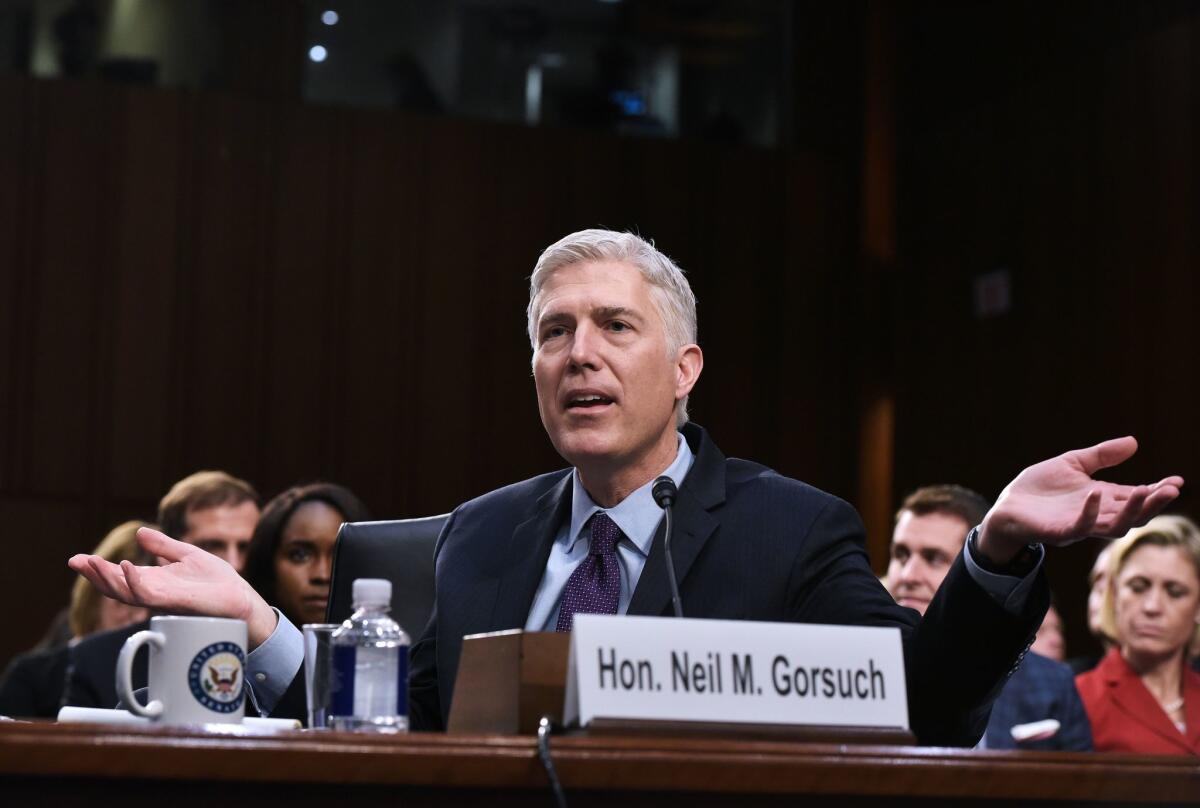Senators work quietly on long-shot bid for compromise as Democrats secure votes to filibuster Gorsuch

- Share via
Reporting from Washington — Democrats now officially have enough votes to filibuster President Trump’s nominee for the Supreme Court, Neil M. Gorsuch, setting up the possibility of a history-making showdown that several senators Monday were urgently trying to prevent.
Even as both sides appear headed for a confrontation that would end with a change in the Senate’s rules to eliminate filibusters against Supreme Court nominees, conversations have been quietly underway behind the scenes among a handful of lawmakers from both parties who are trying to find a way to deescalate. Their ability to strike a compromise remains doubtful, however.
Whatever happens, Gorsuch is all but certain to be confirmed. The issue now is what the rules will be when the next vacancy occurs on the high court. Gorsuch would fill the seat of the late Justice Antonin Scalia — one conservative replacing another. But the next vacancy could change the balance on the court.
As the maneuvering continued, the Senate Judiciary Committee advanced Gorsuch’s nomination Monday on a party-line vote. As the panel did so, several senators announced their positions, bringing the number of Democrats who have publicly said they would support a filibuster against Gorsuch to 42 by day’s end, one more than needed to sustain a filibuster and block a vote on the nomination under current rules.
At least one senator, however, indicated that his decision to filibuster came with an asterisk — Sen. Chris Coons (D-Del.), who is among those trying to convince colleagues to step back from the brink of the so-called nuclear option that would upend Senate rules.
As Coons became the pivotal 41st Democrat to say he would back the filibuster, he said he would vote against ending debate on the nomination “unless we are able, as a body, to finally sit down and find a way to avoid the nuclear option.”
Democratic senators involved in the discussions essentially want an assurance that if they allow a vote to proceed on Gorsuch, Republicans will drop the threat of rules change in the future, maintaining the 60-vote threshold on subsequent Supreme Court vacancies.
But with partisan tensions running high in the Senate, and trust low, such a deal is difficult to reach and almost impossible to enforce, congressional officials said.
Senators have been at this crossroads before, with mixed results, which adds to the uncertainty ahead of the votes to cut off debate on the nomination. The key votes are expected Thursday.
More than a decade ago, in 2005, a bipartisan “gang of 14” senators struck a deal that ended the Democratic blockade of then-President George W. Bush’s judicial nominees without having to resort to a rules change.
But more recently, in 2013, then-Senate Majority Leader Harry Reid (D-Nev.) changed the rules for confirmation of lower-court judges and executive branch officials. That ended the Republican filibuster of President Obama’s district court and appeals court picks.
Reid’s move angered many Republicans. Because of the partisan tensions, the talks this time involve more of an invisible gang than the effort in 2005.
“There’s no gang. There’s no negotiations. Just having some conversations,” Sen. John McCain (R-Ariz.), a leader of the 2005 effort, said last week.
Many senators fear that if Republicans change the rules to allow confirmations with a simple majority, the Senate would soon begin to run more like the House, where majority rules, rather than as a slower-moving body that requires bipartisan cooperation to achieve a 60-vote threshold to advance most items.
Already, Trump was able to confirm his Cabinet nominees with just 51 votes, thanks to the change Democrats made four years ago.
Even though Senate Majority Leader Mitch McConnell (R-Ky.) has insisted the rules change would cover only Supreme Court nominees, many senators worry that it’s only a matter of time before the rules would be changed to eliminate filibusters on legislation too.
“The damage done to the Senate is going to be real,” said Sen. Lindsey Graham (R-S.C.), who was also a member of an earlier gang. “If you ever wondered about how important the Senate is, you’re going to find out it becomes increasingly more important now.”
But the difficulty of finding agreement shows how badly relationships have eroded, especially as outside groups are pressuring both parties not to relent on Trump’s nominee.
Democrats are being pounded by liberal activists to oppose the president; Republicans are desperate to help Trump’s wobbly administration gain a victory in its first 100 days.
“Neither side of the aisle has had the maturity or the willingness to stand up to the pressures and cause this institution to operate in the way it should,” Sen. Bob Corker (R-Tenn.) said in a recent floor speech.
“I hope that somehow or another, we will have the ability to avoid what I see as something that is very, very detrimental to the Senate and, in the process, very detrimental to our country.”
How the Senate’s once-revered traditions are falling victim to partisan divide »
ALSO
Seeking a way forward, Trump increasingly finds himself at odds with his own party
Senate heads for ‘nuclear option’ if Democrats filibuster Gorsuch nomination
More coverage of politics and the White House
More to Read
Get the L.A. Times Politics newsletter
Deeply reported insights into legislation, politics and policy from Sacramento, Washington and beyond. In your inbox twice per week.
You may occasionally receive promotional content from the Los Angeles Times.








